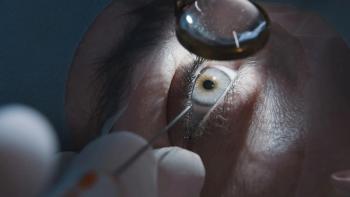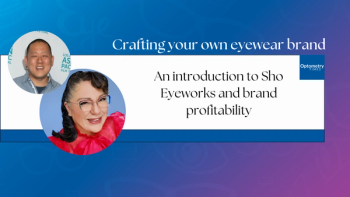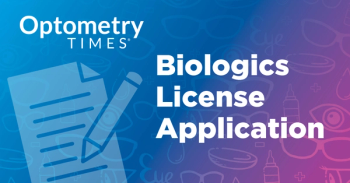
VEW 2024: Leveraging AI to improve patient care and practice management
Dr Brianna Rhue chats about AI, technology, and how it can make your practice run more efficiently, from front-of-house to back.
Brianna Rhue, OD, FAAO, FSLS, sat down with Optometry Times to discuss all things AI and technology as well as how to integrate them into your practice in a way that enhances patient care and helps your practice run more smoothly. Rhue is the owner of West Broward Eyecare Associates and the co-founder and CEO of Dr. Contact Lens. Vision Expo West takes place at The Venetian Expo in Las Vegas, Nevada, September 18-21, 2024.
Video transcript
Emily Kaiser Maharjan:
Hi everyone. I'm here with Dr Brianna Rhue, who is the owner of West Broward Eyecare Associates and cofounder and CEO of Dr. Contact Lens. She is here to discuss her Vision Expo West presentation, "Elevating the patient care experience through technology and AI." So thank you so much for taking the time to chat with me today, Dr Rhue. I'm so excited to dig into this.
Brianna Rhue, OD, FAAO, FSLS:
Yeah, I'm excited to be here and share what we're going to be talking about.
Kaiser Maharjan:
Yeah. So can you tell me more about how technology can enhance the patient experience, just overall?
Rhue:
Yeah, so what we're going to start presenting with is just, how do you view yourself as a consumer? So before you walk in the door that day, how are you doing business with other businesses around you? How did you order your coffee in the morning on your way to work? If you do that. How do you make an appointment yourself for, let's say, your kiddo and their dentist? So I'm always looking outside of industry for ways we can enhance our businesses, because we are businesses, for the patient care experience, but also elevating our team members and what they're also doing.
Kaiser Maharjan:
Fantastic. And how does AI play into this?
Rhue:
AI is obviously such a buzzword, Emily, so I want to debunk a couple of things around AI and share with people how I'm incorporating it in patient care, how I'm explaining how it's going to enhance their eye care in the future. So one thing AI is really, really good at now is imaging. And when I'm pulling up my wide field image, I say, you know, this is what AI is really good at. We don't have it right now, but this is, again, why I want to take these serial photos. You know, year over year over year, this is what's going to enhance it. So eye care is really at the center of healthcare, because of what we get to do. The eye is the brain, and the only place we can view the blood vessels; it's the only place we can view nerves without cutting somebody open. And that's what's really cool about what we do. So this is more about that on really AI as use cases. So what use cases can you come up with to make your job easier? Make it better for the patients, make it better for your team? So we'll get kind of back to basics on what all that means.
Kaiser Maharjan:
Yeah, that's fantastic. And do you have any examples of how you use AI in your practice? And like, does your staff participate? Is it mostly you? How does that kind of look in that environment?
Rhue:
So it's really about data. It's the data in our EMR systems is not good, so it's really hard for AI to come and function. So that's one of our pieces, is instead of doing all these drop downs for a contact lens patients, which is like 28 drop downs if you're fitting like a toric multifocal contact lens, we shouldn't be having to waste our time doing that. So those are—that's a specific use case that, for instance, we've solved to make the data in our EMR systems that really doesn't tell us much into actionable data that you can do something with. So that's how we better communicate with patients. That's how we better take care of them.
Because, like, yes, we're in the eye care industry, so eye care to us is like, top of mind, right? Not everybody wants that. Like a patient wants to see you once a year, effectively, efficiently and do business with you when they want to. So what we're wasting time, you know, on all of our posts, and I get it that's important, but it's getting back to solid patient care, and taking care of each patient that sees you from start to finish all the way through, and if they leave, how do you pick that back up? So that's like, AI is this buzzword, but we're still not doing some of the basics. So that's what we'll go into as well.
Kaiser Maharjan:
Yeah, fantastic. And do you have any specific examples or scenarios that you could share showing how technology and AI can help with those patient care experiences, or with picking those patients back up and helping you get back to those basics?
Rhue:
Yeah. So it comes to, I use the word homework, right? So when a patient gets to the front and they ask for a copy of their prescription, well, that sucks, right? So instead of printing the prescription, which you legally do, can you digitize it? Can you send them a prescription digitally? Can they order from you at 10:00 at night? So that's where more automation needs to happen, so you have to empower yourself those ways, and that starts by asking yourself how you consume products, and then making that easy for your patients. So it's bringing that all together. Looking at what your team is doing with mundane tasks, you know, like appointment reminders, or even not having a live appointment scheduler. So smart scheduling. These are all things on the horizon for our schedules to get better and more consistent, for our practices to benefit.
Kaiser Maharjan:
Yeah, absolutely and so AI is only one tool in the technological tool belt. So what are some other technologies that you would recommend for doctors to explore?
Rhue:
So this is another piece: your team. You've got to get your team understanding. So we all have, I have seven gatekeepers, right? But I've trained my gatekeepers to take demos and to bring me innovation, I can't do all of that. I just saw 23 patients, and then for me to come and, like, tinker and play with things? Like, I hate how on LinkedIn, people are like, "I wish doctors would play with these things." I'm like, When?" Like, when do you want me to do that? Right? So it's understanding you need to empower your team around you to bring you innovation and be part of it, because they are going to make or break it.
So one thing too is we look at ourselves as eye care practices that happen to own a business. We need to flip it. We're business owners that practice eye care. You take that a step further: We are technology companies that provide eye care. So it's from front of the house technology on what you're doing, appointment scheduling, how people call you, how you're reminding people, how you're sending prescriptions to the back of the house, which we're all really, really good at. Your widefield imaging, your TigerChart, your meibography or scleral lens topography, your topography—like all of that tech is super fun, so we're willing to invest in those pieces, but we're not willing to invest in the core business functions. So it's looking at it differently, on how you're investing your capital to run your business, and then that's where real growth happens, like that's where you explode in a good way. Getting your your team doing better things, man, get rid of this double data entry. Get rid of this—what they're doing, just—sit at the front desk for 4 hours and see if you can make it. You'll be squirming. Like challenge yourself to just go sit there and see what your team does and what's giving them energy and what's sucking their energy. And be part of that.
Kaiser Maharjan:
That's an absolutely fascinating perspective shift. I really, really like that point of view. Yeah. So is there anything else that you'd like to discuss that we haven't touched on?
Rhue:
No, the one thing is like, when you're going to Expo, yeah, we go for the education, but you're going to Expo to see the vendors, to see what is new and shiny. lean into these. Maybe come with your credit card where you're going to purchase one thing, right? So that's why we have these amazing conventions, is because of our vendors and our exhibitors and our partners; look at them as partners. So don't be scared. Don't like, lean back when they're talking to you; lean in, and ask better questions. The first question out of your mouth should not be, "What does this cost?" Absolutely not. Go in with, what is this going to do? How is this going to change my patient care? How is this going to change what my team is doing? How is this going to enhance my business? Ask those questions. And then lead with, "What is the investment?"—not, "What is the cost?—[ask] what is the investment?
Kaiser Maharjan:
Well, thank you so much for chatting today. Dr Rhue, I really appreciate your insight on technology and AI. I really look forward to learning more about all of this with you down the road.
Rhue:
Thank you, Emily.
Newsletter
Want more insights like this? Subscribe to Optometry Times and get clinical pearls and practice tips delivered straight to your inbox.













































